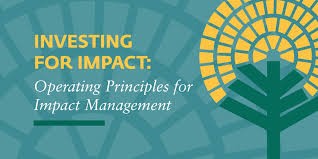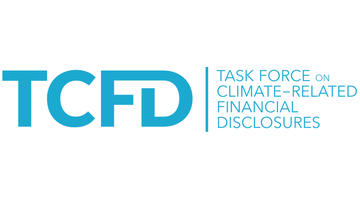Transparency and accountability
In 2019, FMO committed to two initiatives that foster transparency and accountability of our investment practices related to climate and impact. FMO became a signatory to the Operating Principles for Impact Management and reports, for the first time, in line with the recommendations provided by the Task Force on Climate Related Disclosures (TCFD).
Operating Principles for Impact Management

In April 2019, FMO became a signatory to and advisory board member of the Operating Principles for Impact Management, a global initiative led by the IFC to increase the transparency and accountability of impact investing. This addresses the risk of ‘impact washing’, while fostering confidence in impact investing.
The Principles enable investors to compare organizations based on impact performance alongside financial returns. It assesses their operations against nine principles around strategic intent, origination & structuring, portfolio management, impact at exit, and disclosure.
FMO already applies most of these principles. All our investments must adhere to strict environmental and social standards and state their impact as contributions to the SDGs. Nevertheless, there were a few areas where FMO had to change its impact measurement and processes to align more fully with the Principles.
FMO has aligned its corporate strategy with the SDGs and impact goals since 2014. This has been operationalized in an impact management and monitoring system, organized around our core SDGs (8, 10 and 13). FMO first selects its investments on the principle of additionality and is one of the few DFIs to apply ‘attribution’ to its impact results. This means we attempt to weigh the reported impact figures with the share of our investment in projects or companies.
In 2019, FMO introduced changes to how we track expected impact per investment, using a system of impact indicators that aligns with FMO impact labels and impact model. From December 2019, each new investment is assessed and discussed along several financial and impact targets. We have also upgraded our processes for collecting impact performance data so we can compare future estimates with actual performance. Furthermore, we created a Knowledge Management, Learning & Development team to bring lessons learned into the investment decision process more explicitly.
Task Force on Climate-Related Financial Disclosures

Climate Action is one of the key pillars of our 2025 strategy, and we acknowledge we need to demonstrate our responsibility and foresight in considering climate issues. This goes beyond assessing the impact of our activities on the environment as climate change may affect clients vulnerable to the material consequences of and the transition to a low-carbon economy.
This is the first time we report on our approach to climate following the recommendations provided by the TCFD in June 2017. We recognize that improving management of climate-related risks and opportunities is a journey and we plan to improve our practices over the next few years.
Governance: Climate is an integral part of our mission, vision and business strategy. Having oversight on FMO’s strategy and performance, FMO’s Executive Committee is responsible for key decisions related to climate, such as revising the strategy or setting ambitions. Impact-related topics, including climate, are also overseen by the Supervisory Board Impact Committee.
FMO recognizes the importance of systematically integrating climate change considerations into its operations. Climate-related risks and opportunities are covered across various functions. This ranges from strategy and investment teams preparing business plans to dedicated impact teams advising on definitions, policy, and position statements, and monitoring and reporting performance. Our cross-functional working groups monitor climate-related trends, developments and regulations. Where relevant, they provide recommendations to the Executive Committee for improvements to FMO’s climate management.
Strategy: Climate change poses risks to the economies and markets in which we operate. Our clients’ performance can be impacted by physical risks, such as extreme weather, or policy, legal, technology, market and reputational risks arising from the shift to a low-carbon and climate-resilient economy. While this may present investment and business risks for FMO, it also creates opportunities to help clients become more resource and energy efficient, reduce GHG emissions and transition to low-carbon solutions. We continuously assess how this may affect our business over the short, medium, and long term, but our strategy already considers:
Adapting our portfolio: To reduce climate risks and seize opportunities, we are seeking to grow our green portfolio. We finance green projects in the energy and agricultural sector, provide green credit lines to financial institutions, contribute to green funds and issue green bonds. In line with the Paris Agreement, we aim to align our portfolio with the 1.5-degree pathway. We further aim to improve the GHG efficiency of our portfolio and finance carbon negative transactions. For the post-2025 period, more drastic choices may be needed, in line with the Dutch Climate Agreement;
Supporting our clients: We work with clients like Access Bank and Banban Gona to better manage climate risks and opportunities;
Mobilizing climate capital: FMO blends and mobilizes climate funds, for example via Climate Investor One, ElectriFI, and the Dutch Fund for Climate and Development (DFCD). We are also increasing the climate focus in AEF and Building Prospects, and climate is part of the investment strategy of three funds advised on by FMO Investment Management;
Sectoral engagement: We are transparent about our approach to climate and engage other organizations on this topic. As an active member of the Partnership for Carbon Accounting Financials, FMO seeks to create an open-source global carbon accounting standard. We also cooperate with other bilateral and multilateral development banks to harmonize GHG accounting and improve our climate risks and opportunities management. FMO and the Dutch financial sector have pledged to report the footprint of relevant assets as of 2020 and set reduction targets from 2022 onwards through the Dutch Climate Agreement.
Risk management: Following FMO’s Sustainability Policy, we identify, assess and manage climate-related risks and opportunities by:
Protecting our assets: Our Position Statement on Coal states we will not directly finance any coal-based power generation and/or coal mining, and limit our indirect exposure. For all investments, we identify, assess and monitor ESG risks through our risk, compliance and operational processes. As climate change risks are becoming more prominent, we discuss how to improve mitigation and resilience with our clients. In case of agriculture projects, for example, climate risk consideration is inherent to our ESG assessment (e.g. impact on ecosystems and water resources, soil cover or micro-dripping for adaptation). We are currently working on formally integrating climate risk considerations at contracting and monitoring (ESAP). For instance, the assessment of physical risks and exposure in energy and FI related projects will be formalized in our due diligence process. Such discussions will also be held in the board room of our clients. FMO can still improve the way it quantifies risks, but we believe that closer relationships with the clients will raise awareness and allow us to manage risks together;
Managing opportunities: While discussing climate-related risks with our clients, we also explore ways to create new opportunities. Moreover, we identify Green labelled investments and steer our portfolio towards a higher share of such transactions. We set up a process based on our Green definition and eligibility criteria, and internal verification and approval to obtain the label. Green performance at portfolio level is monitored monthly.
Metrics and targets: In line with our ambition to enhance green investments, we are currently measuring climate-related metrics. The results are disclosed in Our Performance.
Green labelled investments: We steer our portfolio towards SDG 13 by setting an annual target on Green labelled investments of at least 32% of annual production. This influences client selection, project preparation and investment decisions;
Avoided GHG emissions: To reflect our activities in transitioning towards a low-carbon economy, we have been measuring our avoided emissions since 2015;
Absolute emissions: Work is ongoing to develop a GHG accounting approach for absolute emissions in our portfolio, which we plan to use for aligning our portfolio with the 1.5-degree pathway. In chapter Our performance we currently report our own GHG emissions scope 1 and 2, as well as part of scope 3 emissions related to staff travel. However, as a bank, our largest footprint lies within our portfolio. In annual report 2020, we start reporting on financed emissions.
Next steps: We continue to assess how climate-related risks and opportunities may impact our business. In 2020, we aim to formalize the management of climate-related issues in line with the TCFD recommendations.